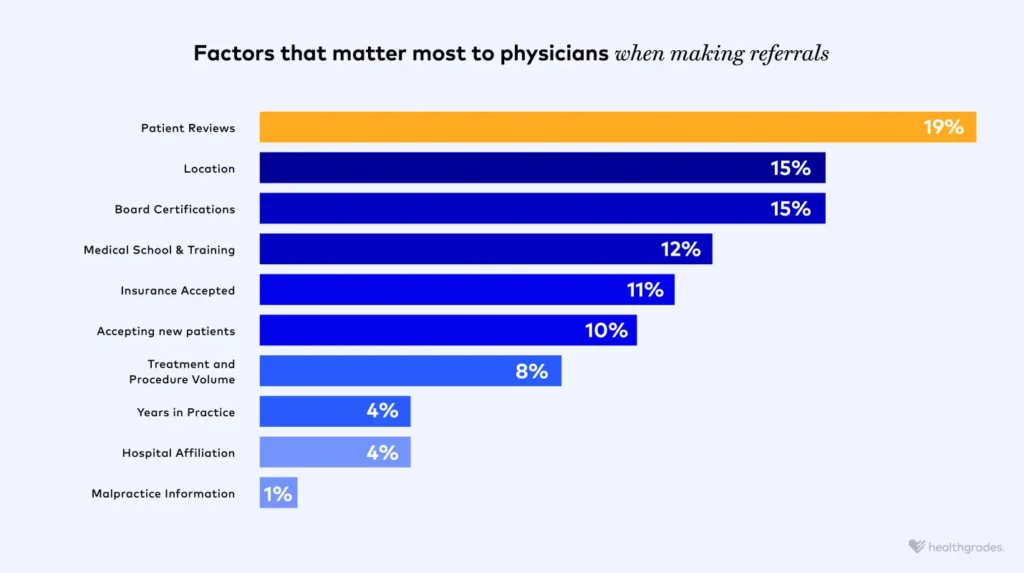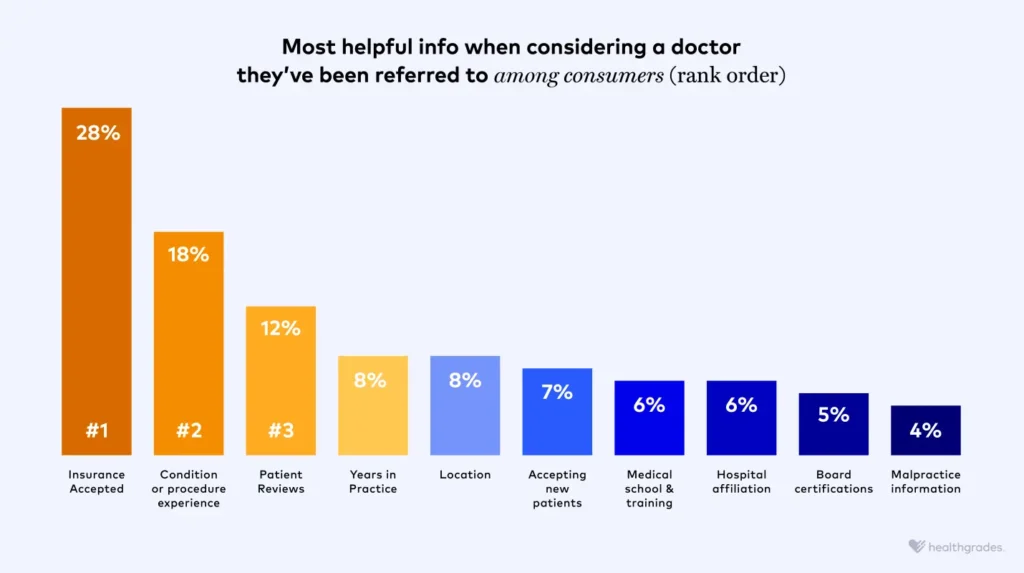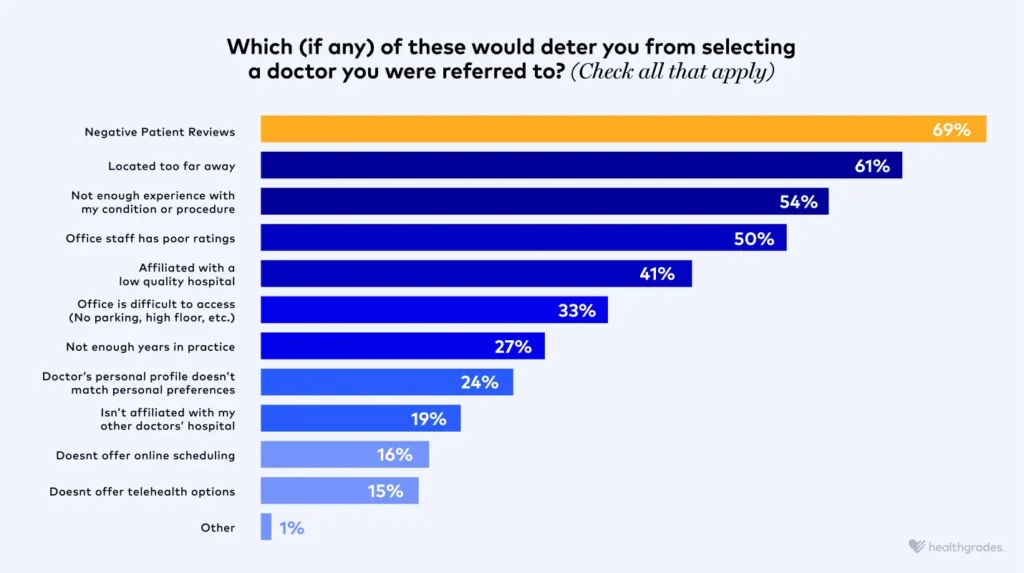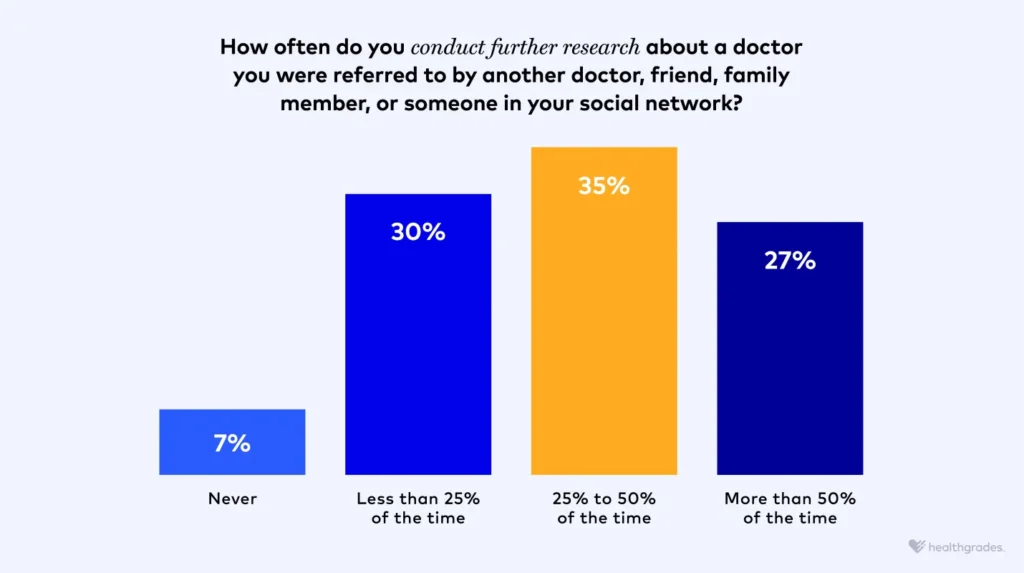Patient reviews drive referrals for physicians and healthcare decisions for patients. Here’s why this matters to hospital marketers.
Doctor appointments are experiencing a healthy rebound after a drop in attendance caused by the COVID-19 pandemic. According to the National Center for Health Statistics, 82% of Americans visited a doctor or specialist in 2021. Likewise, a 2022 MGMA Stat poll found that 55% of healthcare organizations experienced significant growth in patient attendance since 2021.
As patients settle into the “new normal,” they’re catching up with healthcare appointments that were delayed, skipped, or postponed because of pandemic-related concerns, leading to an increase in referrals within the U.S. healthcare system. Referrals are of vital importance to the livelihood of specialty practices—and when PCPs make referrals, they’re often following up with the specialists on test results and treatment updates.
In a Healthgrades survey conducted earlier this year1, we sought to understand what physicians value most when making these referrals and how those factors align with what consumers value as important. Here’s what we found.
Referring Physicians Value Patient Reviews
We asked physicians to rank the factors that matter most when making referrals. Patient reviews topped the list as the most important, followed by location and board certifications.

Physicians want their patients to have a positive experience when they visit a specialist, so they look to first-hand accounts from other patients to inform their decisions.
Patients Also Value Reviews—After Cost and Experience
We asked consumers to rank the factors that matter most when receiving a referral. Not surprisingly, “accepts my insurance” tops the list. Most patients point to cost and insurance coverage as a primary decision factor, with experience and reviews as the next most cited concern.

It’s important to note that negative reviews are the biggest factor that would deter patients from making an appointment with a doctor they had been referred to by another physician.

Consumers Trust Their Doctors’ Referrals
We asked patients how frequently they conduct additional research on specialists when they receive a referral. Nearly three out of four (73%) respondents indicated they do extra due diligence less than half the time.

Given the responsibility felt by physicians to make good referral recommendations, it is easy to see why patient reviews play such a vital role.
The Importance of Digital Reputation Management
Physicians have long known that reviews are effective advertising for their practices. After all, it’s no secret that most patients read reviews before booking an appointment. What may be less clear is the strategic role patient reviews play as doctors recommend peers within their network.
For physicians, engaging with patients online through reviews is a great way to address pressing feedback, build brand presence, and show that the practice cares about the patient experience. For example, if a patient recently complained about a lack of hospitality or attentiveness in your facility, offer to take the conversation offline and investigate the matter further. Remember to thank patients who took the time to leave fantastic reviews praising your team’s service and expertise—but be careful to maintain confidentiality and HIPAA compliance when responding.
Encouraging patients to express their thoughts on your team’s care can help other patients feel comfortable sharing their experiences, ultimately leading to more appointments. According to an analysis of Healthgrades data, healthcare professionals with over seven reviews received 5x more appointment requests than those without reviews.2 Foster an online community forum with your patient reviews, and you’ll start to see better engagement with your brand.
Managing one’s digital reputation is more than just collecting more positive reviews than negative ones—it’s about leveraging these patient touchpoints to reflect on problem areas, enhance healthcare services, and humanize outreach efforts by demonstrating how you’re putting patients first in their search for care.
Use Your Reviews as Tools of Engagement with Healthgrades
More than two-thirds of people who visit Healthgrades profiles will make an appointment within a week.3 Start maximizing the power of your patient reviews by claiming your physician profiles on Healthgrades. Our physician profiles not only house helpful patient feedback but also valuable information, such as treatment-oriented content, areas of medical expertise, educational background, certifications, and frequency of treatment, which compares how often a specialist performs a procedure to similar professionals. Physicians who have a 3-star rating or higher on their Healthgrades profiles see a 150% increase in patient engagement.4 And with over 10 million patient reviews and counting, healthgrades.com offers an effective way to boost visibility through low-funnel outreach.
In addition, as our partner, you can tap into a high-value patient pool you’ll only find here, and drive appointments for your most profitable service lines with guaranteed conversions. Program benefits include:
- Increased visibility: Prominent branding and calls to action on healthgrades.com physician profiles and search results pages
- Competitive intercept: Promote your brand and present your medical staff as alternative options directly on your competitors’ physician profiles
- Syndication network: Reach consumers where they are by extending your brand across the web with our partner sites
- Easy conversion: Promote your site’s online appointment scheduling for in-person and telehealth services on your profiles to convert patients who are ready to appoint. Our solutions both complement and outperform Google SEM to maximize your relevance in search results.
About the Methodology
Survey method
Survey emailed to Healthgrades physician community, including registered members
Sample size
489 survey starts
Sampling error
Margin of error +/- 5-6%.
Recruitment period
February – March 2023




